Night had fallen on February 11th and disgruntled farmers in the Quimper region of Brittany in the westernmost tip of France had found another target on which to vent their anger over the low prices they get for their produce. This time it was not a local supermarket or government building. Instead these farmers took their trailers full of manure to spread at the Chamber of Agriculture itself, the body that is supposed to represent their interests. This building, run by the leading French farming union the Fédération nationale des syndicats d'exploitants agricoles (FNSEA), was attacked with a digger, the entrance hall was bashed and dented, the entrance guardrail ripped out and the ground was covered in manure.
“No one is leading anyone any more,” says one union official who saw the aftermath of the attack. “There are spontaneous movements everywhere. People feel betrayed by their own leaders.” Some farmers even ripped up and burnt their FNSEA membership card during the protest.
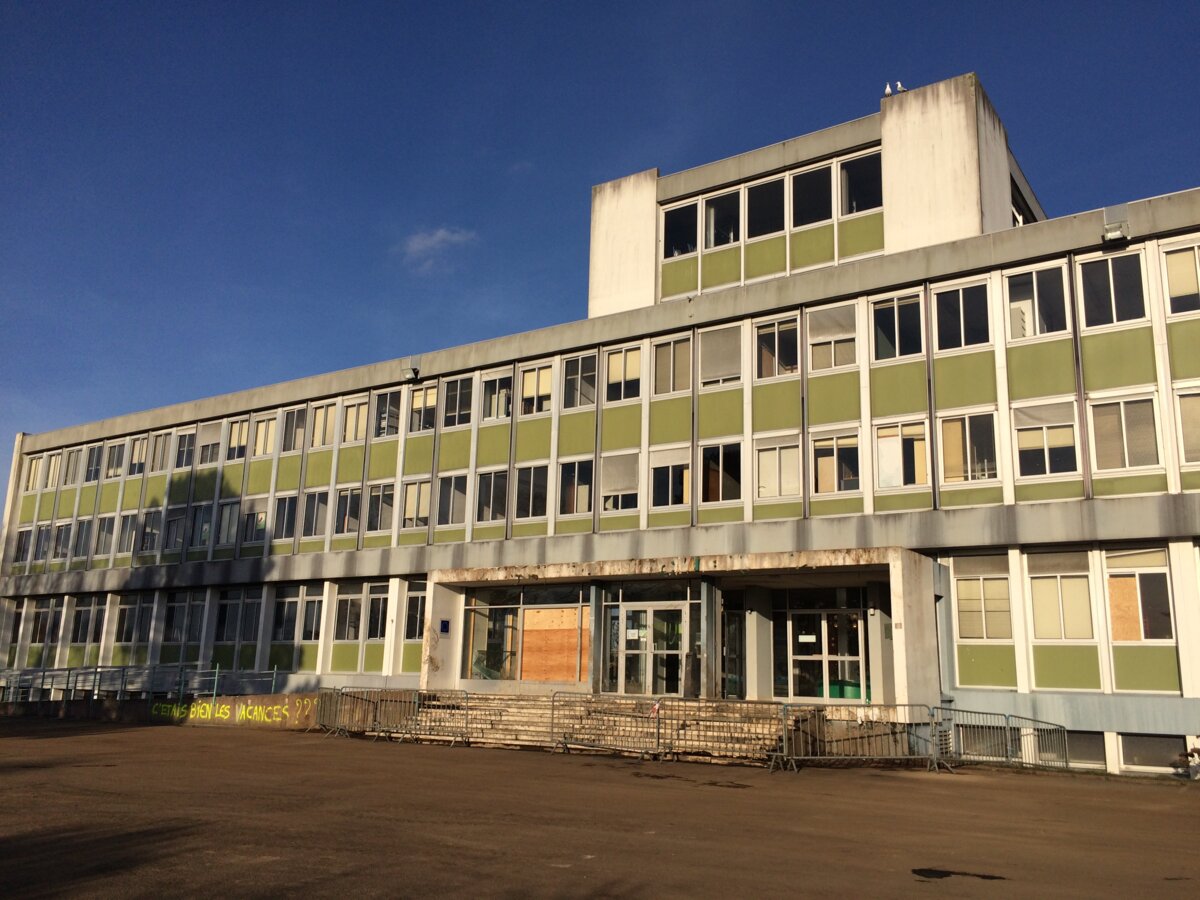
Enlargement : Illustration 1

The night-time demonstration at the Chamber of Agriculture in Quimper was certainly not an isolated incident. The following day there were reports of a protest outside the home of Member of Parliament Richard Ferrand, from the ruling Socialist Party, another at the home of Michel-Édouard Leclerc, boss of the large supermarket chain that bears his name, close to nearby Concarneau, and a third at the headquarters of a subsidiary of the farming cooperative Even at Ploudaniel. This last intervention – during which the farmers found imported dairy produce even though it is a local cooperative – marked the breach of another taboo as far as the protesters were concerned. It showed that local cooperatives – natural allies and supporters of the FNSEA – were no longer to be spared the farmers' anger. Meanwhile on the evening of Sunday February 21st, farmers staged a protest outside the homes of the agriculture minister Stéphane Le Foll at Le Mans, in central west France, and of defence minister and regional president Jean-Yves Le Drian at Lorient in Brittany.
When Mediapart visited five days after the incident at Quimper, the Chamber of Agriculture was still smeared with manure. With a bucket and brush in her hand, a young employee good-humouredly inspects all the drains blocked by the manure. “The door is twisted there,” she points out to a manager. “Next to the broken pane.”
Outside, the protesters' slogans have still not been removed. “Thief” and “Sell-out” have been daubed, but also “Crisis”, “South Africa” and, more bizarrely, “Was it a good holiday?” This last slogan turns out to be a reference to a voyage by FNSEA officials who, as members of the Chamber of Agriculture committee, went on a “fact-finding” trip to South Africa last November. The other smaller unions who belong to the Chamber only learnt about the trip when they read the slogans. “Our officials were neither informed nor invited,” says Jean-Michel Favennec, of the smaller Coordination Rurale (CR) union.
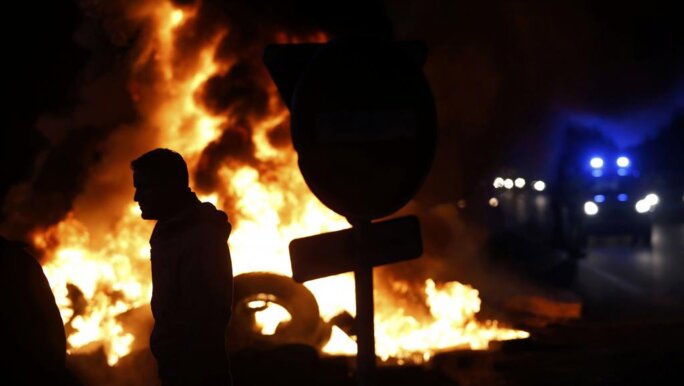
Enlargement : Illustration 2

The president of the local branch of the main farming union – known as the FDSEA locally rather than by the national title FNSEA - Thierry Merret, sought to justify the visit. “All bodies go on fact-finding trips,” he said. “South Africa is a major agricultural producer, of fruit and vegetables as well as milk: we're in world markets and you have to go and see it over there, “ he insisted, while agreeing that the timing of the trip had perhaps not been ideal. Over the last year those same world markets have seen the price of milk plummet by 50 to 60 euros a tonne. The benefits promised by free marketeers over the removal of milk quotas – which disappeared in April 2015 – now leave a bitter taste as far as the dairy farmers are concerned. Their income is in freefall, with a quarter of them earning less than 10,000 euros a year for 2015. Their bank accounts have run dry.
“There is such distress that people no longer know which way to turn,” says Thierry Merret. “They lump all leaders, unions and cooperatives in the same boat. Many aren't with any union, they don't align themselves with anyone.” Five farmers have been arrested and held in custody after the protests outside the Chamber of Agriculture, with one of them being questioned for having almost crushed a gendarme, a claim he rejects.
“I met with two of the protesters on Monday [editor's note, February 15th] and I told them that I would not lodge a complaint against them because they're both farmers like me,” says André Sergent, the chamber's president. “But the prefect is pressing charges and the gendarmes too. Most of them were from the FDSEA and today they are no longer in the official unions. I told them that as well as the doors there were broken window panes and behind there are people who work. The employees questioned me, they asked me: 'Have they gone mad or what?'”
Thierry Merret, who helped lead the so-called red hat revolt against President François Hollande's planned eco-tax in 2013, insists that for the most part he is still able to “supervise” his troops. “At Michel-Édouard Leclerc's place it was very well-supervised, they didn't block anything. On the other hand I don't support the operation at the MP's house,” says the FDSEA boss. The MP in question, Richard Ferrand, who was labelled a sell-out, has now lodged a formal complaint.
Many suggest, meanwhile, that Merret's system of “supervision” is starting to fall apart. “It occurred in four stages,” explains a union official. “The first action was calm, the second was a bit stronger and the third was stronger again where they protested hard, and then for the fourth protest you went back to a quieter operation, to discuss. At least he controlled his members.” That is no longer really the case. Merret himself has been forced to endure whistles while leaving some gatherings, and he has apparently also received threats on his own farm. Last year the local FDSEA boss also saw half of the local federation administrators reject him and resign, even though they did not join other organisations.
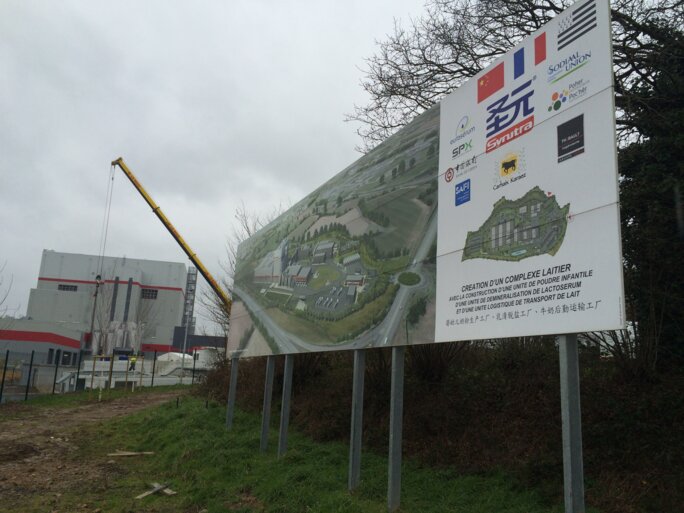
Enlargement : Illustration 3

The odour of manure that still wafts around the Chamber of Agriculture has not spared the offices of the Confédération Paysanne, which represents smaller-scale farmers, situated at the back of the building. “As far as I'm concerned the demonstrators didn't pick the wrong target,” says the Confédération's local boss Vincent Pennober. “Because it's these regional and local leaders who have led us into this dead end; on the world markets. Those people there are among the ones who are destroying agriculture. We wouldn't have done it like that – you can block the roads without putting shit on them – but the target was the right one!” The Confédération and the CR union are preparing to request the accounts for the South Africa trip made by the officials from their rival union the FDSEA. However the chamber's president, André Sergent, takes responsibility for the cost of the trip and even reveals that he has been “asked about going to China”. He says: “There's a programme in place.”
Pointing to a map of the local département or county, Finistère, the Confédération's Vincent Pennober indicates the villages that are joining in the farming revolt north of Quimper. “The young [farmers] were led to believe that they had to invest,” he explains. “The cooperatives gave them [milk quotas] regardless. There are youngsters who doubled their production. Sodiaal [editor's note, France's leading cooperative] did it indiscriminately.” Sodiaal, which is a major recipient of milk produced in the area, has faced questions about its association with the Chinese group Synutra over its plans to build a 120,000-tonne capacity milk drying tower at nearby Carhaix with the support of its mayor Christian Troadec, also a prominent former 'red hat' rebellion leader. It involves an investment of 160 million euros which led the cooperative to suggest “additional volumes” to its milk producer members in the area, a certain number of whom took on debt to produce more. “Perhaps the prices were right when they invested, but no longer,” says one farming advisor. “It's possible that today there are people who continue to make a living off it but they are very rare. There are very few who are making money.”
The protest actions by farmers are indeed a daily event. For example, the Leclerc shopping centre at Quimperlé, east of Quimper, was blocked continuously for a week. The young farmers' association Jeunes Agriculteurs (JA), which is affiliated to FNSEA, meanwhile organises checks on the origin of produce on sale at large retail outlets in a bid to make retailers and consumers aware of the need for traceability. Traceability is also a way of persuading shoppers to give priority to French produce without overly offending the principles of free competition in Europe. On Wednesday, February 17th, around ten young farmers drove to the Kerdroniou industrial zone at Quimper. The first wholesaler they visited was Sodial Legall, which supplies food for local authority and public catering. The instructions were to let them in.

Enlargement : Illustration 4
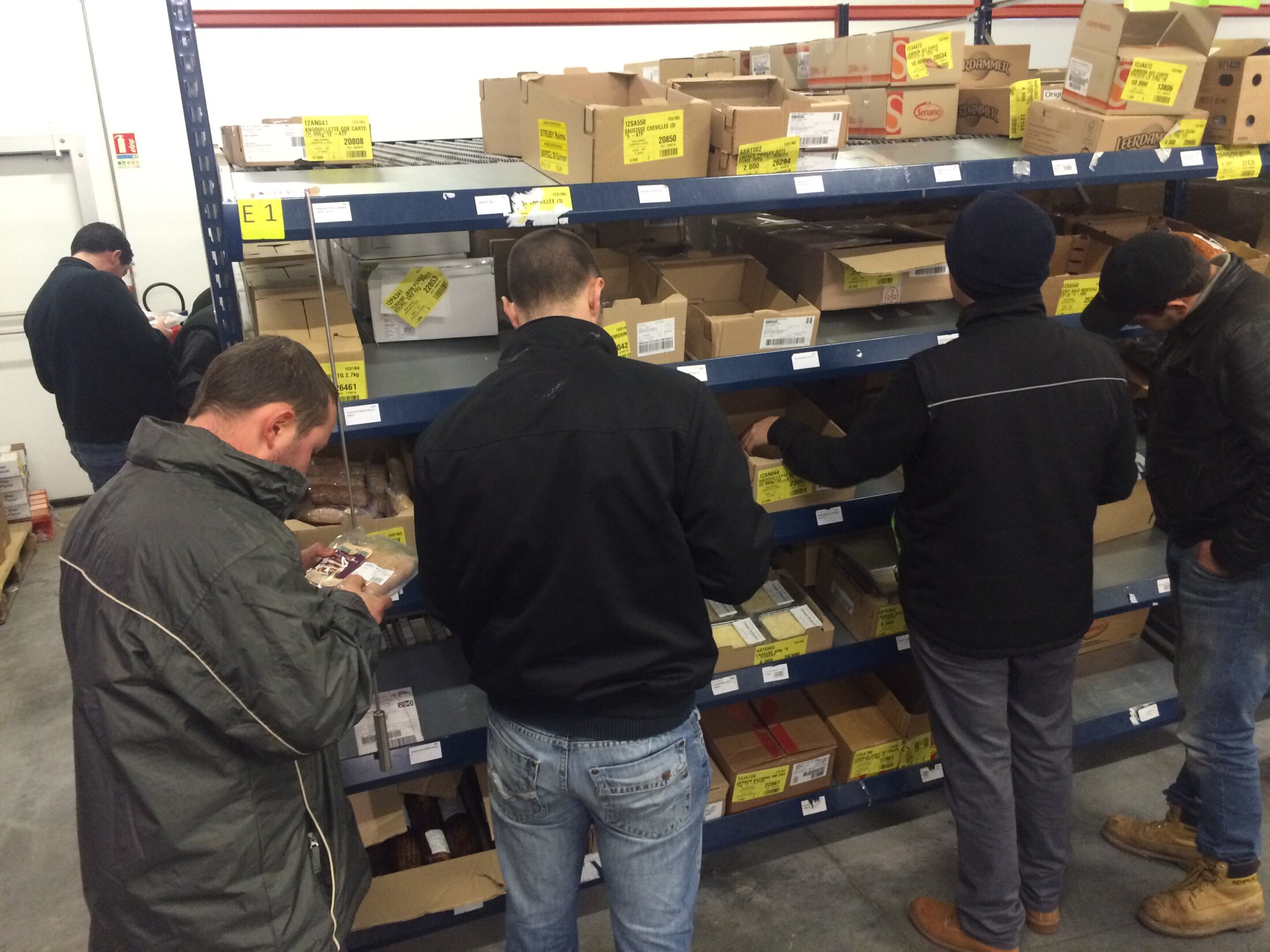
The young farmers spread out cautiously in the refrigerated warehouses, silently searching through boxes and reading labels, handling vacuum-packed liver pâté and gizzards in rolls. “The processing location is often indicated, but not the the origin,” says one of the young farmers, Stéphane Cornec (see photo below). “We're not fooled: when it's produced in France they mark it on the labels.” Sometimes the big firms leave some room for doubt over the precise origin such as the rillettes from Le Mans inspected by the team, whose meat comes from “France or Spain”.
The activists get staff to open the freezer area, a huge warehouse kept at -25C, where it's impossible to remain for long. “Uhhh, it's worse than the tear gas,” exclaims one, in a reference to the dispersal tactics used by police and gendarmes during disturbances. Some palettes catch their attention. “There's Argentine rabbit!” They also see Dutch veal and Spanish beef tongue. Each one has a quick look around and leaves. “We've been working on this 'Milk from nowhere, meat from anywhere' campaign for more than a year but it's not making progress,” says Stéphane Cornec. “Last year a proposal for a decree emerged. The [agriculture] ministry said that they would rework it to make it 'euro-compatible' but there's been no news since. We're not very calm when we go into supermarkets...”
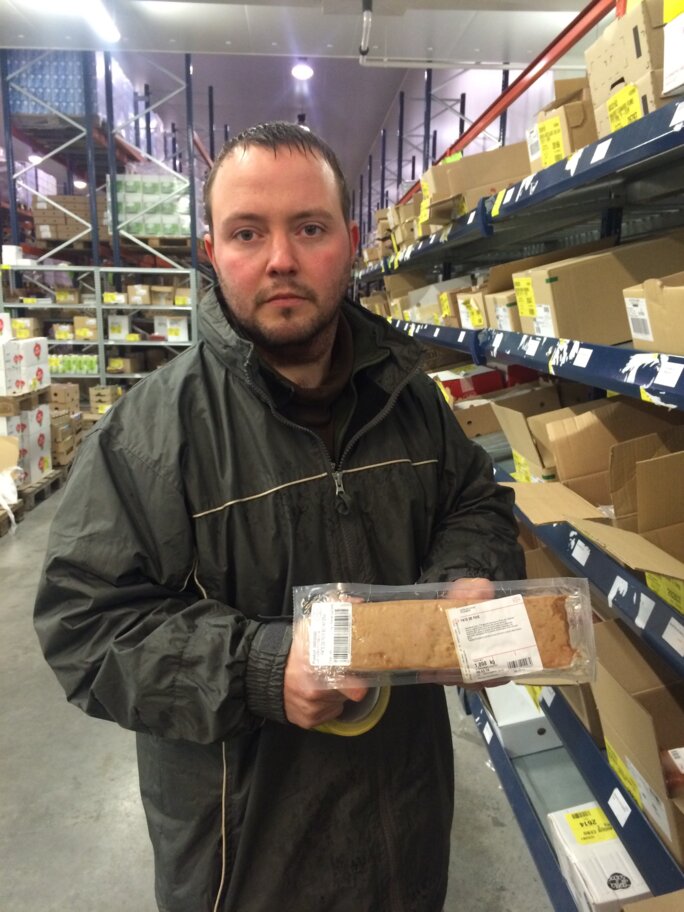
Enlargement : Illustration 5

The discovery of foreign products during “checks” at Sovefrais, a subsidiary of the Even cooperative, at Ploudaniel caused anger among farmers. “It was far from being 'clean' at Sovefrais: more than half of the dairy products were not French. There was Belgian and German milk. There was damage in the warehouses and some produce destroyed as well...” While a large firm can import what it likes, in principle a cooperative has other responsibilities. The feeling of betrayal is everywhere and the most commonly-used insult is “sell-out”.
“We've been abandoned,” says Florent Plouzenec, a young farmer speaking after the inspection at Kerdroniou. He set up in farming in 2013. At the time the price of milk was not a cause for concern, standing at 340 euros a tonne. Florent borrowed 500,000 euros to build a 2,000m2 building to go into partnership with his father. He planned to “double” the farm's output, aiming to go from 300,000 to 600,000 litres a year with a total of 75 cows. “The dairy wanted me to do more,” he says. “Today I owe more than 6,000 euros a month to the bank. I am 85% in debt. Since the price of milk fell the bank has been taking the money from my account. They don't give a toss, they're sucking me dry. They have my bank account details. I'm not paying the suppliers: they're waiting for the end of the summer. They'll be paid out of my cereal crops when I've produced them. Everything costs money, it's astonishing. They tell us 'we gave you money to set up the farm', come off it: you've got nothing left!”

Enlargement : Illustration 6

The young farmer says he is “permanently stressed”. He says: “Every day there's a cow that goes down, a tractor that won't start and there's the fear of having costs that you can't pay. There's the building to pay for and that causes family conflict. Sometimes my dad says he's going to throw himself in the pit. Nothing's going well. And you can't let yourself stop. If you stop what will you do?”
The other young farmers agree with Florent. “Some get rich off your back,” says one. The protests and incidents are evidence of a general feeling of discontent. “It's really only the young who are doing something today,” says Stéphane Cornec. Among possible solutions, going organic is one option, though they have no illusions about how hard that is. “You really have to want it, to prepare for it for two or three years, to put some fields, some pasture to one side,” says Julien. “It's the same with direct selling [editor's note, to the general public]. You can't sell 100,000 litres of milk by selling direct at the wave of a magic wand,” says Florent.
Prime minister Manuel Valls recently announced a reduction in the obligatory social security charges that farmers have to pay, but the news is greeted with a shrug of the shoulder by these young farmers. “That concerns the farms that have employees, income and thus social charges to pay,” they point out. In other words something that will help the larger-scale farmers. They see it as a new concession aimed at Xavier Beulin, the national head of the FNSEA. Beulin, who is also chairman of the board of the oil seed group Sofiprotéol, which makes animal feed, does not escape the young farmers' wrath either. “Our interest is in seeing that the input [editor's note, the feed given to cows] is not expensive, his is to sell at lot of it at a high price!” says Julien. Another grievance is that in recent months the agriculture ministry has refused to agree to European financial aide – temporary repayable capital funds – for those farmers facing financial difficulty, precisely those who need it the most.
The signs written on tarpaulin show that you are approaching the farm belonging to Christian Hascoët, head of the local branch of the independent milk producers' association the Association des producteurs de lait indépendants (APLI). These signs have been spreading around the countryside since January, with bin bags and black tape covering village signposts. At the farm entrance one slogan in particular gives a flavour of the mood: “Milk war: a solution = regulation”. The trade unionist knows young farmer Florent and his father, who live not from from him. “This young man did what I would have done at his age, you can't blame him for anything, anything!” he says.
“Normally the FNSEA puts people in the streets and then blows for the end of playtime,” Hascoët explains. “They've tried for the last eight day to make them go home. There is complete disorder. There are no longer any points of reference. There are no leaders. The political institutions don't know whom to talk to. With social networks information is circulating. Connections are being made between people who would not normally meet,” he says, recalling that during the milk strike of 2009 he did not even have a mobile phone.
Christian Hascoët says that barriers are being broken down. “Last week young farmer activists and independent producers paid a visit to Even. That's massive taboo that's gone. Not long ago it was a fortress: no one dared to visit this cooperative. They found raw materials that came from abroad; yet we thought that this cooperative was there to add value to the raw materials of its members. But it's a typical case: the cooperatives collect the milk and the added value is provided by the subsidiaries and it's not redistributed. It's all that that upsets the farmers.”

Enlargement : Illustration 7
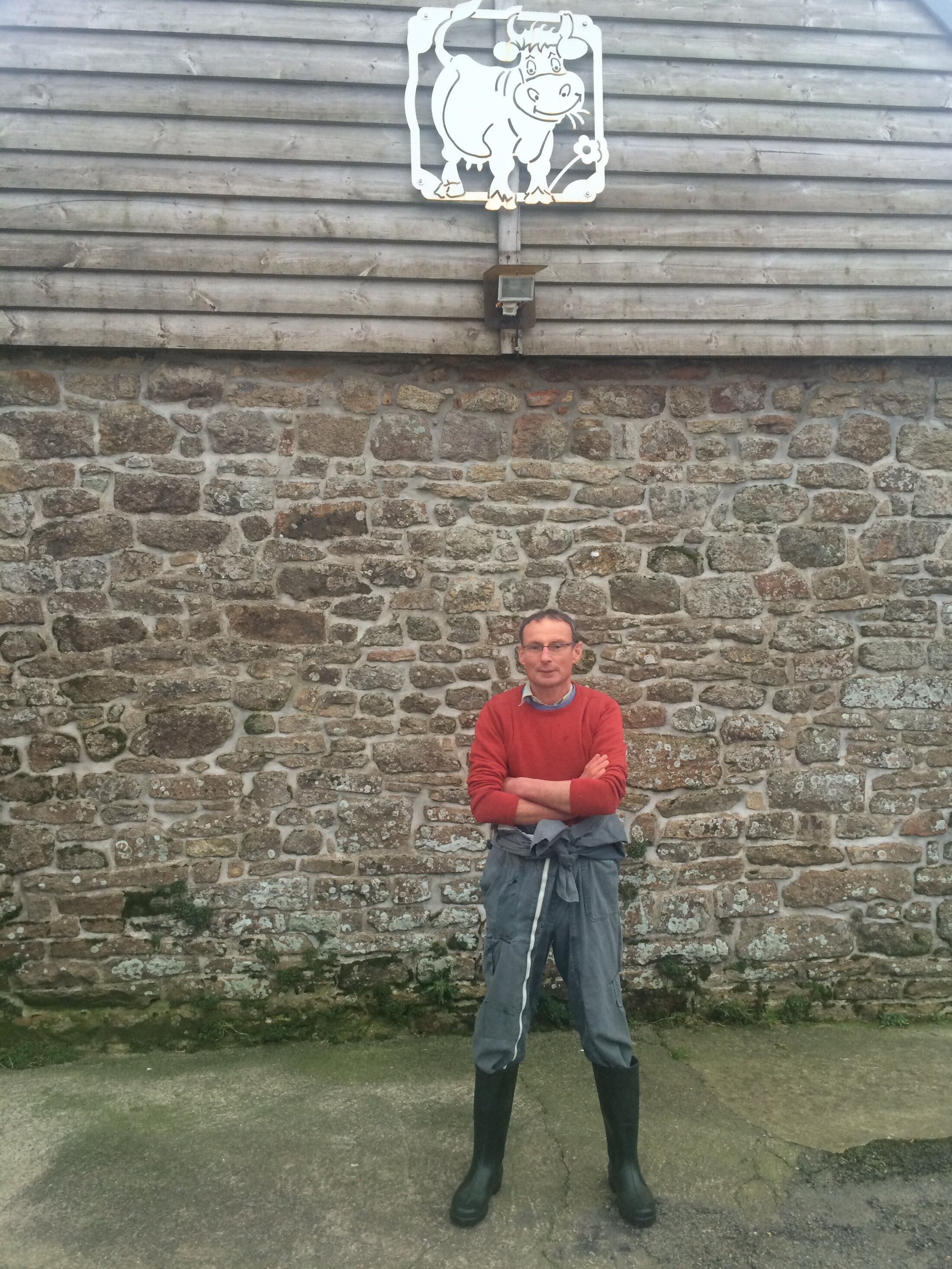
The trade unionist believes that the current state of affairs is not simply a cyclical crisis. “Prices are not ready to pick up without European measures,” he says. But Christian Hascoët believes that French attempts at negotiation were killed from the outset by the main farming union the FNSEA and its boss. “Xavier Beulin even called for deregulation, through his European union COPA-COGECA – so how can you expect him to bring about regulations? They're in the process of causing their own troops to die around them today.”
The figures on de-regulation speak for themselves. “With the end of quotas Europe increased its milk production by 5 to 6 billion litres [editor's note, from the the existing 140 billion litres],” says Christian Hascoët. “Today it's Europe that is causing the collapse in prices. But for the industrial firms it's all going well: production has gone up and the price has gone from 365 euros a tonne in 2014 to 285 euros a tonne today. At an economic level it's great business!”
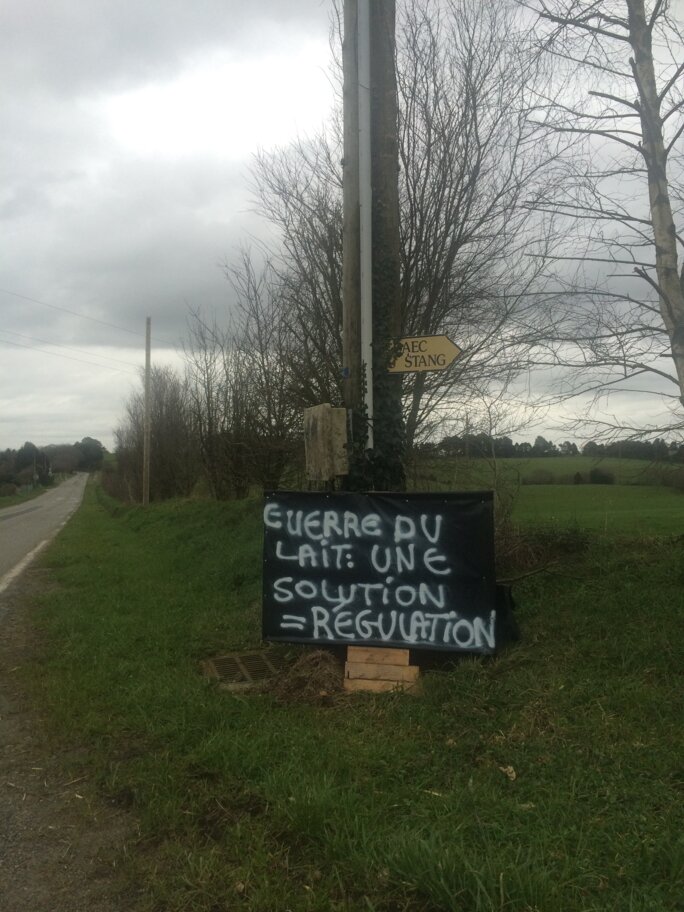
Enlargement : Illustration 8

The farmer and trade unionist says the damage can be seen everywhere. In Belgium the price of milk has fallen to 240 euros a tonne. “The Danes are just paying the interest on their debts: on average they have debts of 20,000 euros a cow,” he says. And the deregulation of the dairy industry has also had a major knock-on elsewhere, “playing havoc” with the beef industry. “We knew that it was going to turn out badly, but what has surprised us is the speed of the change. Producing for a market that doesn't exist, that could only end badly,” he says.While they wait for structural measures to help them, the farmers are trying, on an individual level, to change the system. “I've put my cows out to pasture,” says Christian Hascoët explaining how he now uses less of the food concentrates that are designed to boost milk production. “Today, producing less is an act of management.”
Further south, at Quimperlé, a couple in their forties, Pierrick and Aurélie, have decided to change things on their farm. “If everyone lowered their production by 2% or 3% the problem would be sorted,” says Pierrick. “That's one-and-a-half cows...but people want to produce, produce, they are trained to do that.” Instead this couple have committed themselves to going organic and start on May 5th with the cooperative Biolait. Their faces light up when they talk about it. Though technically not easy, it is not impossible to switch in two years they say. “We have quite simply stopped using chemicals. We have reviewed the techniques for growing cereal crops. And we've trained in the use of essential oils, to avoid antibiotics. When the cows are less pushed [to produce milk] they're in better health,” says Pierrick.
This decision should see the couple getting around 450 euros a tonne for their milk. The switch away from the traditional system has left the pair a little isolated from current events. But they have followed the demonstrations closely, and witnessed the growing tensions. “At the last meeting there were people who were cracking up,” says Aurélie. “The young [farmers] were on the edge of tears. Even selling all they have, they haven't got enough to pay their debts. They're aged between 30 and 35 and they are already ruined.”
-----------------------------------------------------------------------------
- The French version of this article can be found here.
English version by Michael Streeter


